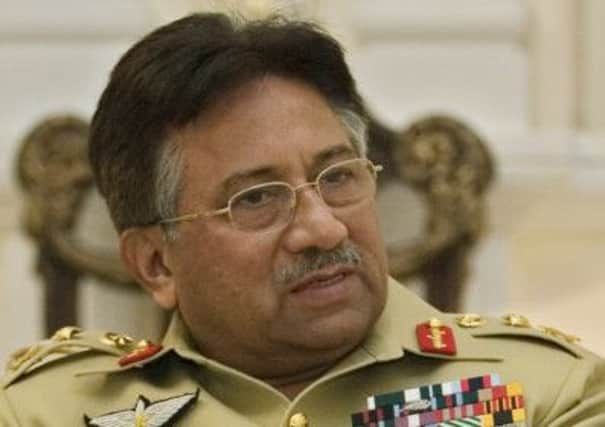Pervez Musharraf arrested over firing of judges


The move marks a dramatic break with a political culture in which former military rulers have remained above the law.
The former army chief had hoped to rekindle his influence in a general election in May, but has instead become embroiled in a showdown with judges who fought bruising battles with him while he was still in office.
Advertisement
Hide AdAdvertisement
Hide AdA magistrate raised the stakes earlier yesterday when he ordered Musharraf be placed under house arrest for two days before he is due to appear again in court on allegations of illegally detaining judges during a crackdown on the judiciary in 2007.
Musharraf is accused of violating the constitution by placing judges under house arrest after he sacked the chief justice and imposed emergency rule.
His office said the charges against him were baseless and have been cooked up by an “overzealous judiciary” and “unscrupulous lawyers”.
“The allegations levelled against the former president in judges detention case are false and politically motivated,” the office said in a statement.
Judges had signalled their intent to take a tough line with Musharraf yesterday when they ordered his case be heard in an anti-terrorism court, claiming detaining judges was an attack on the state.
Police later transferred Musharraf into custody at a guesthouse at their headquarters in Islamabad after a senior officer failed to issue paperwork necessary for him to remain under detention at his home, said his spokesman, Mohammad Amjad.
“He’s been shifted to a police guesthouse for two days of remand,” Mr Amjad said.
Pakistani television broadcast footage of Musharraf leaving his villa on the edge of Islamabad in a black four-wheel drive vehicle escorted by police cars. He had fled there on Wednesday after a judge refused him bail in court in Islamabad.
Advertisement
Hide AdAdvertisement
Hide AdThe spectacle of a man who once embodied the army’s control of the state being forced to answer to judges was a potent symbol of the way power has shifted in Pakistan, which has been ruled by the military for more than half its history.
The 11 May general election will be the first transition between elected civilian-led governments in Pakistan.
Musharraf seized power in a coup d’etat in 1999 and resigned in 2008. He returned to Pakistan after almost four years in London and Dubai last month to stand for the National Assembly but was disqualified by election officials earlier this week. While the sight of a former army commander being arrested is sure to rankle some in the military, Musharraf’s ill-starred return has bemused some former comrades. “I don’t think the army was in favour of him returning and tried to dissuade him,” said General Hamid Khan, a former senior commander. “But he decided to come, and now has to face this. The army is staying out of it.”
However, the order to place Musharraf under house arrest was a surprise development. He faces a raft of other legal challenges, including allegations that he failed to provide adequate security to prevent the assassination of former premier Benazir Bhutto in 2007. He has also been accused of treason for imposing emergency rule.